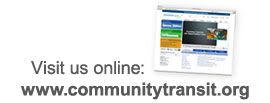Community Transit’s Choice Connections program recognizes worksites in Snohomish County and the City of Bothell who support Washington State Commute Trip Reduction goals. They go above and beyond to encourage their employees to use smart transportation alternatives to driving alone. Congratulations to the Choice Connections award winners for 3rd Quarter 2014:
Wednesday, January 21, 2015
Community Transit recognizes stand out participants
Community Transit’s Choice Connections program recognizes worksites in Snohomish County and the City of Bothell who support Washington State Commute Trip Reduction goals. They go above and beyond to encourage their employees to use smart transportation alternatives to driving alone. Congratulations to the Choice Connections award winners for 3rd Quarter 2014:
Ben Stockinger, Smart Commuter
Smart Commuter of the Quarter
Ben
Stockinger is webmaster for the City of Lynnwood. He is diligent about
developing, managing and supporting the city’s web resources and services. Ben
has also been a devoted advocate of alternative transportation for the past 15
years by biking, walking and carpooling to work and meetings. He is a personal
advocate at his worksite, and helps educate his coworkers on biking to work.
Ben chooses to bike to work, rain or shine, even during the rainy Pacific
Northwest weather.
ETC of the Quarter
Marko Liias has done great things for the
Commute Trip Reduction program at the City of Mukilteo. Within his first couple
months, he reviewed their entire CTR program and set in place new strategies to
achieve success and educate city employees. Due to his efforts, the City of
Mukilteo achieved over a 50% increase in employees tracking their non-drive
alone trips in RideshareOnline.com. Marko’s efforts also contributed to their
employees more than quadrupling their number of drive alone miles saved, which
helps ease traffic congestion and supports a healthy environment.
Employer of the Quarter
Panasonic
Avionics Corporation provides its employees with the tools and encouragement to
ensure a successful worksite Commute Trip Reduction program. They hosted an
appreciation luncheon for rideshare participants, and educated employees on the
RideshareOnline.com system. They delivered another great perk, a certificate
for a paid day off, which will be awarded to three participants using a commute
alternative to driving alone. During the third quarter alone, Panasonic
participants have removed more than 43,000 lbs of CO2 from the air
we breathe and saved almost 2,200 gallons of fuel.
Choice
Connections rewards commuters for choosing a smart alternative to driving
alone, and offers the tools and resources needed to get started. When you
choose a smart commute, your efforts reduce traffic, save money and time, and
help the environment. To learn more about the Choice Connections program,
please visit Community
Transit Choice Connections.
Friday, January 16, 2015
You Can't Teach An Old Dog New Tricks, So We'll Tell Him About Our Animals on the Bus Policy
By Laurel McJannet
There’s an old saying in the journalism biz:
There’s an old saying in the journalism biz:
“When a dog
bites man, that is not news. But if a man bites dog, that is news.”
Well, this week, the news was all about a dog who took the bus.
Media outlets far
and wide went doggone crazy over the story of Eclipse, a dog who learned to
ride the bus alone to a Seattle dog park. That’s right—a Seattle dog park, which
makes Eclipse a KCMetro bus rider. It was on ABC
News, the Washington
Post, even Huffington
Post picked up Seattle’s own KOMO-TV
coverage.
We love this
story. Many of us at Community Transit are dog owners and have 1, 2, 3 of our
own at home. However, we’d like to take this opportunity to let you know we
don’t plan to change our policies about animals on our buses in light of this story. You can read up
on our animals on buses policy here, but I’ll take a
moment to give you the highlights here.
Service animals
are allowed on all Community Transit buses as long as they are harnessed,
leashed or tethered. This is per the American’s with Disabilties Act (ADA). If
the device used prevents the service animal from doing their job or the
individual’s disability prevents them from using a device, the service animal must be controlled through voice, signal or other
effective control.
This is my
10-month old dog, Bandit.
Bandit is a
non-service dog. He is not allowed to ride on Community Transit’s commuter
buses (those are routes numbered in the 400s and 800s).
Bandit can
explore Snohomish County on our local buses (with his person, of course) as long as he is on a leash
and is wearing a commercially-produced muzzle that covers he mouth and is
secured behind his head.
Now, if you have
another type of small animal, (a reptile, bird or cat), s/he must be in a
confined carrying container and held on your lap or at your feet.
Whether you have
a service animal or a non-service dog, all owners must have complete control of
their animals at all times. Animals can’t occupy a seat, block the aisle or
wander around the bus annoying our fellow passengers.
We have this
policy in place to ensure the safety of your animals and your fellow riders. Thanks in advance for being great pet owners and transit riders.
Monday, January 12, 2015
2015 State Legislative Priorities
 The 2015 Washington State Legislature convenes today in Olympia. It is a biennial budget year, which means the session is scheduled for 105 days. Many budget-year legislatures continue into special sessions, taking business further into the spring.
The 2015 Washington State Legislature convenes today in Olympia. It is a biennial budget year, which means the session is scheduled for 105 days. Many budget-year legislatures continue into special sessions, taking business further into the spring.Community Transit will be tracking legislative activity closely, as several bills could make a big difference in the future of transit service in Snohomish County.
Legislation that would allow the agency to ask local voters to increase financial support for transit service is the top priority in this year’s state legislative agenda.
Community Transit's 2015 State Legislative Priorities
"Local Option" legislation – Community Transit is at the maximum taxing authority allowed by law. The agency is asking the state legislature to pass “local option” legislation that would allow the agency to seek up to a three-tenths (0.3) of one percent sales tax increase to support transit.
Should this legislation pass, it would be up to the Community Transit Board of Directors to decide if and when to put such a measure to a local vote.
Regional Mobility Grant projects – Approval of the WSDOT Recommended Regional Mobility Project List for 2015-2017, which includes $6.8 million for the Seaway Transit Center near Paine Field and $2.68 million for a Mukilteo Park & Ride.
State transportation package – Secure legislative passage of a statewide transportation funding package that includes significant state investment in public transportation, and includes $1 billion (or 10 percent of total revenue) for Snohomish County transportation projects.
Maintain existing programs – Fully fund the Regional Mobility Grant program at $50 million, plus re-appropriations, for the current biennium. Continue the fee revenue-based transit operating grant program at $26 million per biennium, and maintain funding for the vanpool, special needs and Commute Trip Reduction programs.
Transit-friendly legislation – Support legislation that provides for the effective and efficient delivery of transit services within an integrated multi-modal transportation system. Oppose legislation that would negatively impact the oversight, financing, construction, and delivery of transit service and projects.
As the session moves forward, keep reading this blog for updates on activity concerning transit service and funding. We'd love to hear your thoughts.
Subscribe to:
Comments (Atom)







